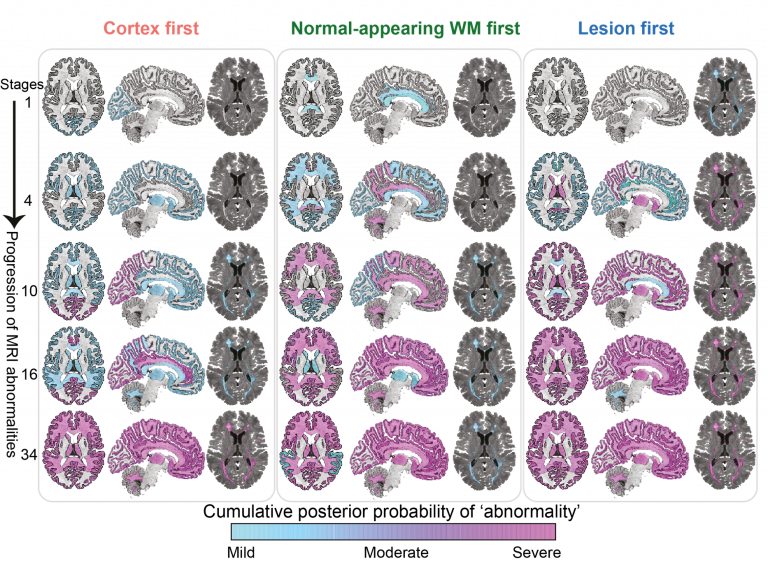CLOSED:Developing reinforcement learning models for precision medicine in multiple sclerosis (23002)
PhD Studentship - Developing machine learning algorithms for personalising multiple sclerosis care

3 November 2023
Primary Supervisor: Dr. Arman Eshaghi
Secondary Supervisor:Prof Frederik Barkhof and Dirk Smeets (Icometrix)
A four-year funded PhD studentship is available at the Centre for Medical Image Computing (CMIC) and UCL Queen Square Institute of Neurology in collaboration with an industrial partner in MedTech (Icometrix). Funding will be in line with UCL policy for PhD stipend which can be found here. This scholarship is for students with 'Home' fee status only.
The successful candidate will join the UCL CDT in Intelligent, Integrated Imaging in Healthcare (i4health) cohort and benefit from the unique multidisciplinary activities and events organised by the centre.
Background
Multiple sclerosis is a chronic disease for which more than 20 disease-modifying treatments (DMTs) are available to slow down the disease. However, research has indicated that about 25% of patients start on a treatment that is working suboptimally, and, on average it takes almost 4 years before a treatment switch happens.
The objective of this project is to develop a data-driven predictive model that helps to identify the best treatment for each patient. We know that MRI contains valuable predictive information. For example, it has been shown that MRI measures indicating brain shrinkage, can predict long-term disability. Currently, selecting the right treatment for the right patients is subjective. An artificial intelligence model combining MRI and non-imaging data would allow making more evidence-based treatment decisions when choosing the right DMT. In this project, the candidate will develop deep reinforcement learning models that can use the widely available MRI data and combine it with clinical measures to predict the best treatments for individual patients. The outputs of this PhD project will be (a) models that prepare real-world data for downstream modelling, and (b) generate imaging biomarker measures and (c) recommend best treatment for individual patients.
Research aims
Developing multi-model fusion methods integrating neuroimaging biomarkers with clinical data in real-world MS populations using (a) deep neural network architecture that can prepare routine-care quality data for downstream processing, (b) deep reinforcement learning models that can provide predictions of future course of MS and best treatments. The model will be trained on existing longitudinal MRI and clinical data, as well as patient-reported outcomes and be incorporated in Icometrix’ ePRO tool (icompanion).
Person Specification
Candidates must have:
- A master’s in computer science, Artificial Intelligence of similar.
- Interest in Neuroscience and Brain Imaging.
- Knowledge of Python (Pytorch and MONAI), R, Computer Vision in general.
This studentship is only open to students that are eligible for Home Fee status, please see here for more details.
How to Apply:
Please complete the following steps to apply:
- Make a formal application to via the UCL application portal . Please select the programme code MPhil/PhD Medical Imaging and enter Developing reinforcement learning models for precision medicine in multiple sclerosis 23002 under ‘Name of Award 1’.
- Send an expression of interest and current CV to a.eshaghi@ucl.ac.uk, cdtadmin@ucl.ac.uk and dirk.smeets@icometrix.com. Please use the subject title: Project Code 23002 and quote your UCL Application ID.
Application Deadline - Ongoing until the position is filled.
Application Process:
- After the deadline, all applicants that specified Project 23002 and with a Portico application will be considered for interview.
- Candidates will normally be invited for interview within two-weeks of the deadline. If you have not been contacted within this time-period, you have unfortunately not been successful in being shortlisted.
- The interview panel will normally consist of the supervision team on the project and the CDT Director.
- The interview will normally consist of a short presentation (5-10mins) by the candidate followed by questions from a panel.
- The successful candidate will be informed by email and given a week to confirm whether they wish to accept the PhD place and funding.
- Note that applications without specifying the project they are applying for and/or making a formal Portico application will be automatically rejected.
- Once accepted, a formal UCL offer of admission will be sent to the applicant as well as an offer of studentship funding.
 Close
Close

